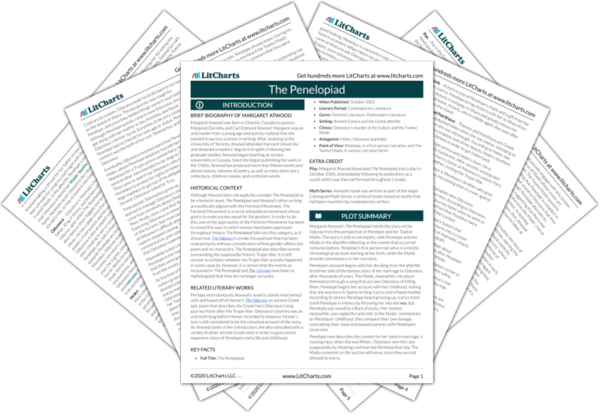Summary
Analysis
Penelope states that this was the worst part of her trials, and that she cried constantly. Odysseus still did not return and Telemachus began ordering his mother around. He started challenging the Suitors, which made Penelope concerned that he would be killed. Eventually, Telemachus secretly left in a ship to go look for Odysseus. Penelope found this very mean of him, but she also worried for his safety, since one of the Maids told her that the Suitors were sending a ship after him to ambush and kill him.
Telemachus, as a teenager, is starting to come into his own male identity, and begins to exhibit traditionally masculine traits like aggression in his behavior toward the Suitors. In a classic example of teenage rebellion, Telemachus leaves Ithaca without telling his mother, distancing himself from female authority.
Themes
In the Odyssey, a herald named Medon warns Penelope of the Suitors’ intention to kill Telemachus. Penelope here sets the record straight, saying that she knew about it first from the Maids, and had to act surprised—so she cried and her Maids wailed too. Penelope chastised the Maids for not telling her about Telemachus’s departure until Eurycleia confessed to being the only one to help him. Eurycleia told Penelope that she and Telemachus didn’t tell Penelope of his plan because they didn’t want Penelope to worry.
Penelope’s explanation of her side of the story with Medon is one of many instances throughout the book when Penelope’s perspective deviates from the official version of the story. When Penelope chastises her maids, the reader begins to see how, though Penelope loves the Maids, she treats them unfairly and never questions their status as her inferiors.
Themes
After her crying fits, Penelope usually fell asleep and dreamed. On the night that Medon told her about Telemachus, she dreamt that Odysseus was having his brains eaten by the Cyclops, that he swam to the Sirens, and that he was enjoying sex with beautiful women—first goddesses, then Helen. The nightmare that Odysseus was having sex with Helen woke Penelope up, and she prayed that it was not a prophetic dream.
Penelope’s dreams of Odysseus having sex with Helen show how profoundly the rumors of Odysseus’s infidelity seem to have affected Penelope, triggering her insecurity so much that she imagines her archenemy Helen as Odysseus’s paramour, keeping him from returning home.
Themes
When Penelope finally went back to sleep, she dreamed that her sister, who had been sent by the goddess Athene, stood by her bedside and told her that Telemachus would come home safely, and that the gods did not want her to suffer. When Penelope asked about Odysseus, however, her sister refused to answer. Penelope thought that the gods did in fact want her to suffer, and that the gods prefer human suffering to animal sacrifice.
Penelope’s second dream features her sister, who, except for this moment, is never mentioned in the novel (though the dream is also mentioned in the Odyssey). Penelope’s conviction that the Greek gods want mortals to suffer shows just how pessimistic her worldview has become.
Themes
Get the entire The Penelopiad LitChart as a printable PDF.













